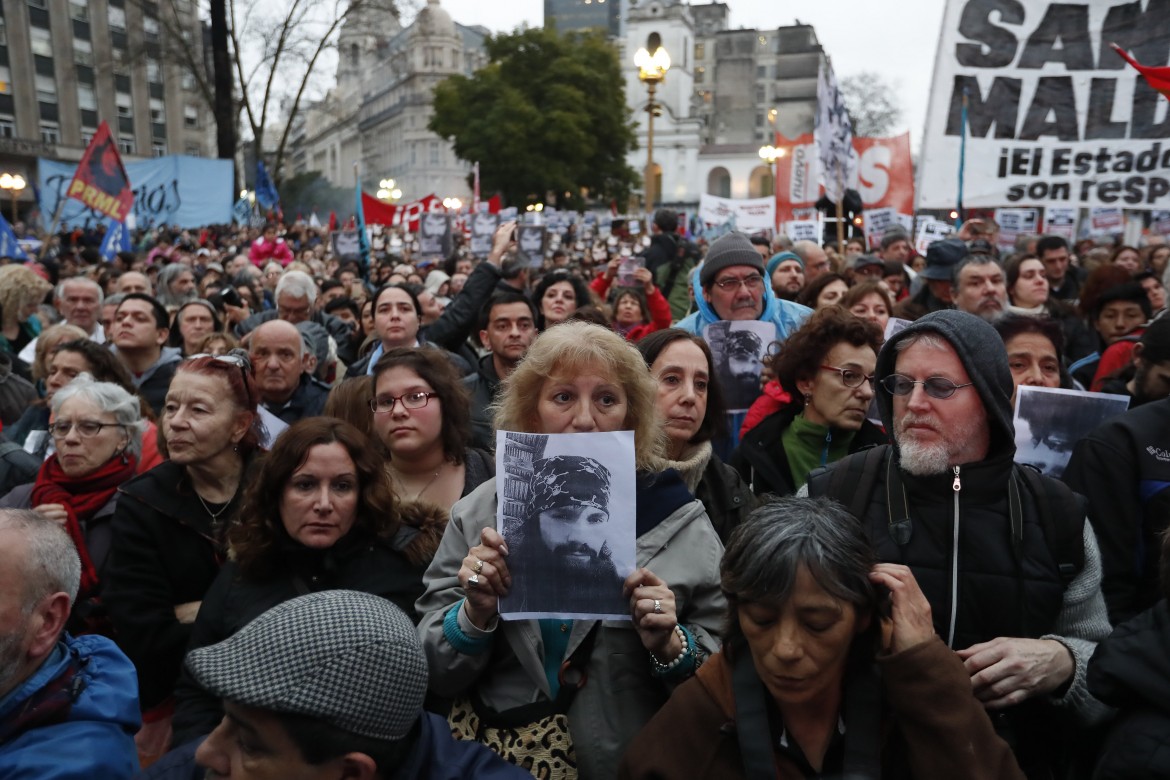Analysis
Feminists and indigenous groups join forces in Argentina land struggle
NiUnaMenos and other feminist organizations unite their struggles with those of indigenous peoples demanding their rights land occupied by the Benetton corporation.

NiUnaMenos and other feminist organizations in Argentinean Patagonia met last week at a large assembly in El Bolsón, near the snow-covered Andean mountain range. The buzzwords of the day — #NuestrosCuerpos, #NuestrosTerritorios and “Where is Santiago Maldonado?” — highlight the growing confusion in the region. And, sadly, the Italian entrepreneur Luciano Benetton plays a central role.
The forced disappearance of Maldonado, an Argentine backpacker supportive of indigenous rights, took place during the state police suppression of a road block carried out by the mapuche community Aug. 1. The young man was attending. The case made international headlines, and its repercussions have far surpassed the Macri government’s intention to silence Santiago.
The case is related to an ongoing land dispute that has long been associated with the militarization of the area. The blockade had been organized to protest the arrest of mapuche leader Facundo Jones Huala, of Pu Lof en Resistencia Cushamen (Chubut province).
Since March 2015, that community has begun a process of territorial recovery against the occupation by the Benetton clothing company. The protagonists are urban and suburban youth (mostly from the tourist town of Bariloche). Decades ago, their families were stripped of their land and had no other choice but to move to the cities as low-wage workers. Now, several young mapuches have chosen to return.
At the assembly, we spoke with a woman from the housekeepers’ union, who explained the motivation. “Mostly we are mapuche women,” she said, “uprooted from our communities to work in houses in the city, where we have been forced to be ashamed of what we are.”
In recent months, growing state repression has targeted several communities in the vicinity of high-value infrastructure projects: real estate compounds, tourist facilities, mining activities. These kinds of economic interests have for years lead to the expropriation of lands and the complicity of public institutions, judges and police forces. The “Conquest of the Desert,” as the military campaign at the end of the 19th century was called, marked the consolidation of the nation-state with the massacre of indigenous mapuche, tehuelche and ranquel peoples.
The idea of calling this place a “desert” was designed to sanction the crusade and continues to act as a legitimizing factor in the theft of lands by multinational companies that acquire them through local landowners or, by various means, through the state.
The scenes of that military “conquest” are now being replicated in the cells of local police stations, like the one in which the mapuche Elizabeth Loncopan was unjustly detained two weeks ago. At first, she was accused of Maldonado’s disappearance, in a bizarre attempt to blame a fellow activist. Later, the judge who ordered the detention was dismissed after several community members peacefully occupied the courthouse in the town of Esquel.
The day before, hooded people burned down several houses in the Vuelta del Río community, a paramilitary action fitting the government’s modus operandi. Increasingly, the state is resorting to repression and the criminalization of social protests in any form.
“We’re not asking for the title to the land,” said a mapuche leader during the assembly. “We’re proposing another way of inhabiting the land.” She was referring to the government’s attempt to reduce the confrontation to a property dispute, a deception intended to assign individual titles for parcels and subsequently make (coerced) land sales possible.
The conflict on indigenous territories appears similar to other urban conflicts in Patagonia and northern Argentina, on the basis of a complex map of real estate speculation carried out by large companies (for instance, agribusiness, mining projects or hotel compounds). The territorialization of conflicts is becoming more and more acute, since the dynamics of expropriation require more and more violence. And when locals put up resistance, their activism is criminalized.
At the feminist assembly, there were discussions about popular power and ancestral power, a novel combination in the sense that the communities involved include youths with an urban mindset. Their search for community ties are different from clichés of cultural purism or folkloristic aspects. The assembly was a tangle of difficult meetings: more than just an ancestral homecoming, it was an initial chance to bring together the demands of feminist organizations and indigenous groups. The stories that came together gave one the sense of a mind in motion, and it obliges feminism to rebuild as popular, communal, urban and indigenous feminism. It forced organizers to consider the question of how feminism — and meetings with stakeholders — can strengthen anti-colonial practices and alliances with regard to certain conflicts.
The concept of “body-territory,” and the claim of autonomy over both, is key to this shared challenge. For this reason, the assembly initiated a form of political action that cannot be reduced to abstract solidarity. To the extent that activism becomes an itinerant device, mobilized by conflicts, it requires face-to-face work for the deployment of a collective action in multiple languages (demand and insurgence; daily non-submission and reformulation of public space; sabotage and clash; territory and streets).
The future of this fight finds in feminism a new space for political development and perseveres in the combination of “unusual, uncomfortable and irreverent” alliances. Feminism is not meant to be confined to the narrow notion of gender.
Originally published at https://ilmanifesto.it/patagonia-argentina-una-sfida-comune-per-donne-e-mapuche/ on 2017-10-04
